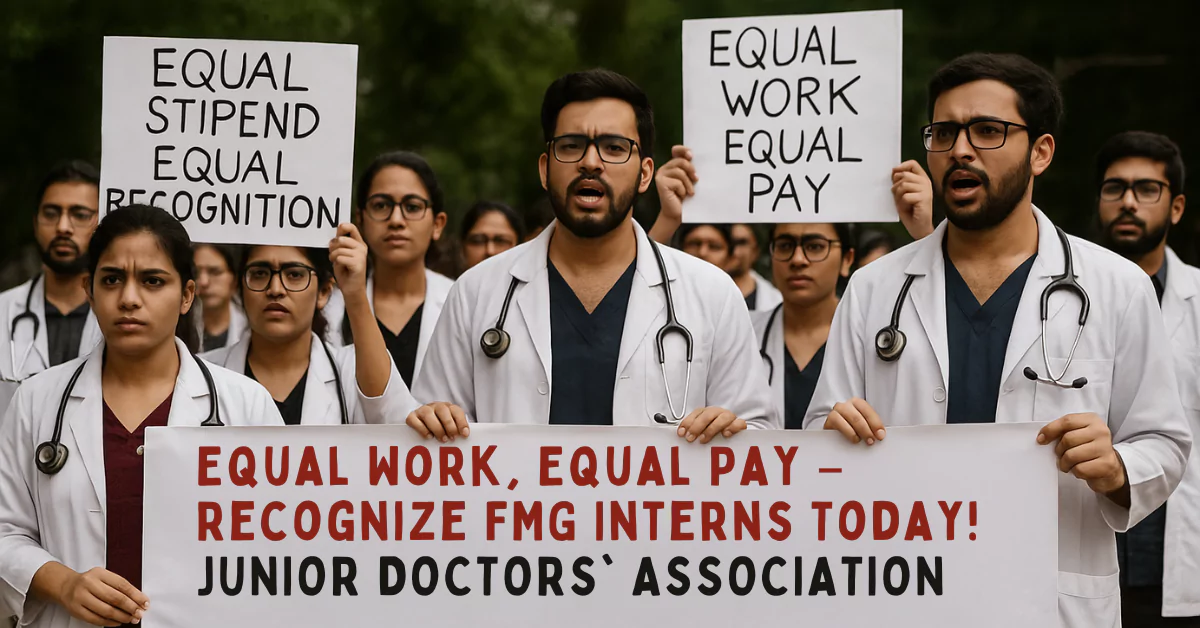Hyderabad: Hundreds of Foreign Medical Graduates (FMGs) interning in Telangana’s government and private hospitals have raised strong protest against discrimination in pay, working conditions, and institutional recognition, despite performing duties on par with Indian medical graduates.
In a formal representation to the Director of Medical Education (DME), the Telangana Junior Doctors Association (T-JUDA) has called for immediate action to end ongoing disparities that have left FMG house surgeons underpaid, under-recognized, and demoralized.
“FMG interns are being treated like second-class medicos despite clearing FMGE and working in high-pressure clinical environments,” said Dr. Issac Newton, President, T-JUDA.
Grievances Raised by FMGs Interns in Telangana
Disparity in Stipend
FMGs posted in 34 government hospitals across Telangana are reportedly receiving only ₹5,000 per month, despite doing full clinical duties, including emergency care, ward rounds, and documentation. This is almost six times lower than the ₹29,792 now paid to Indian MBBS interns as per the latest Government Order (GO) issued on June 28, 2025.
Delayed or Non-Payment
Several FMG interns allege that even the meager stipend is delayed for months or not disbursed at all, causing financial hardship and forcing many to depend on family support or part-time jobs.
Equal Work, Unequal Treatment
Interns report being assigned critical responsibilities due to staff shortages, including handling emergency rooms, night shifts, and casualty wards, often unsupervised.
“Despite taking charge like CMOs (Casualty Medical Officers), we’re denied basic recognition,” said one FMG intern anonymously.
Psychological Toll
FMGs, many in their late 20s and burdened by education loans from studying abroad, are facing emotional burnout, anxiety, and low morale.
“We returned with the intent to serve our nation. But this unequal treatment is breaking us,” said another intern.
JUDA’s Demands to the Telangana Government
T-JUDA has formally requested the Directorate of Medical Education to address the following:
- Equal stipend: Immediate inclusion of FMG interns under the revised ₹29,792/month stipend applicable to MBBS interns.
- Timely disbursement: Guarantee of regular and prompt payment of stipends across both government and private institutions.
- Formal recognition: Acknowledgment of FMGs as equal members of the medical workforce in line with National Medical Commission (NMC) guidelines and FMGE certification.
Legal & Policy Background
FMGs are required to pass the Foreign Medical Graduate Examination (FMGE), conducted by the National Board of Examinations (NBE), to practice in India. Once they clear the exam, they are provisionally registered and allotted internships by the Telangana State Medical Council (TGMC), based strictly on merit.
Despite this, they continue to face a lack of parity in treatment, which experts say violates the spirit of the NMC’s standardization efforts for medical qualifications.
In contrast, Indian MBBS graduates are protected under clear GO directives on stipend, infrastructure, and internship conditions, protections that are not extended automatically to FMGs.
Brain Drain or System Reform?
The current crisis in Telangana highlights a larger national issue. With 25,000+ FMGs returning to India annually, many states struggle to integrate them fairly into healthcare systems. Experts warn that unless urgent reforms are initiated, India risks demotivating a significant portion of its healthcare-ready talent, ironically at a time when rural hospitals and district health centers face acute doctor shortages.
“The FMGE is meant to ensure quality. Once they pass, FMGs must be treated at par,” said a senior official from the NMC who wished to remain unnamed.
The ball is now in the court of the Telangana government. With JUDA’s formal representation gaining momentum, a swift policy response could set a precedent for other states.
At stake is not just the dignity of hundreds of hardworking FMGs but also the credibility of India’s commitment to equitable and merit-based healthcare delivery.
As FMGs continue to serve Telangana’s hospitals silently, the question remains: Will the system finally listen to their voice?

